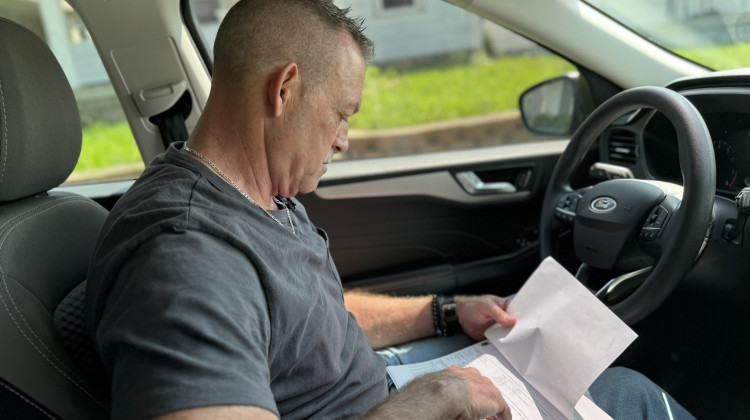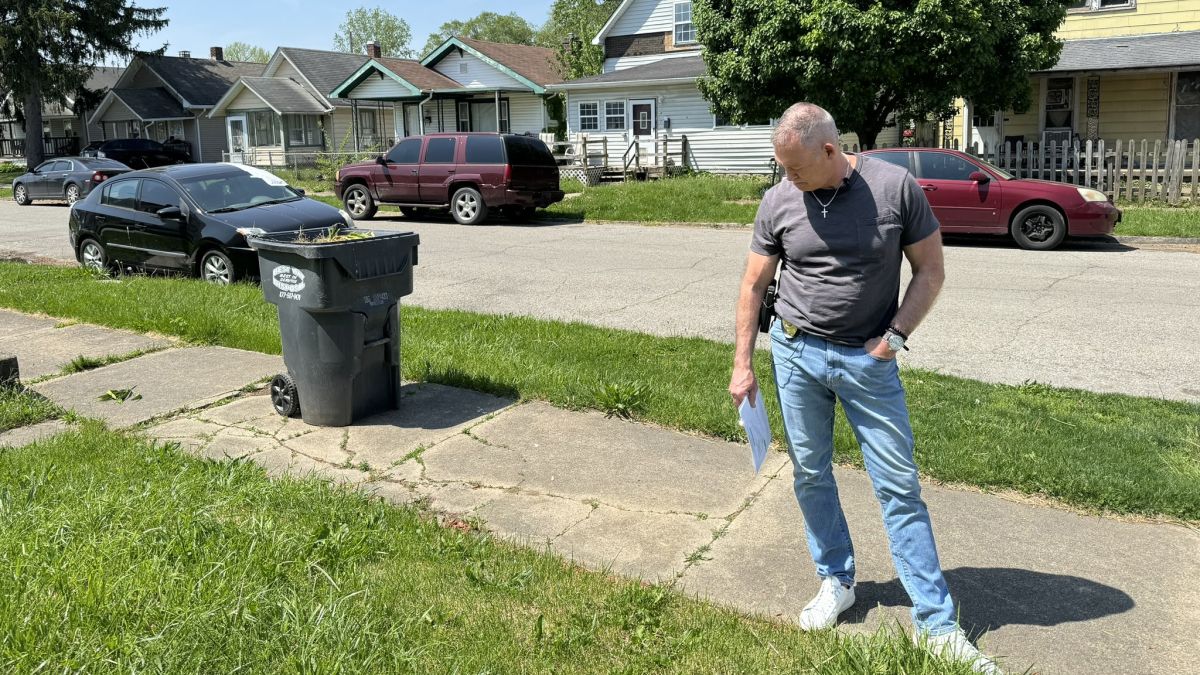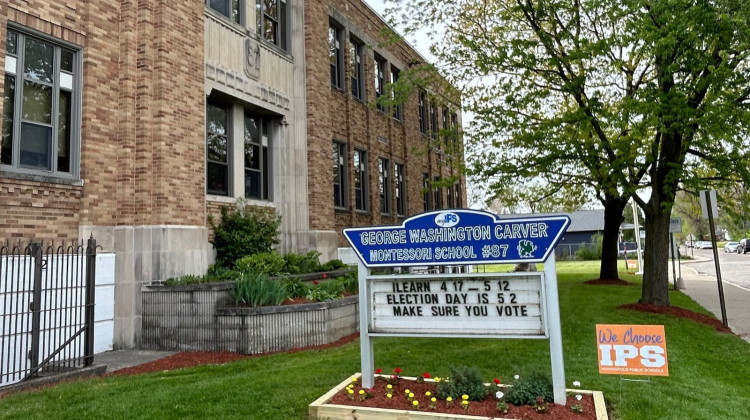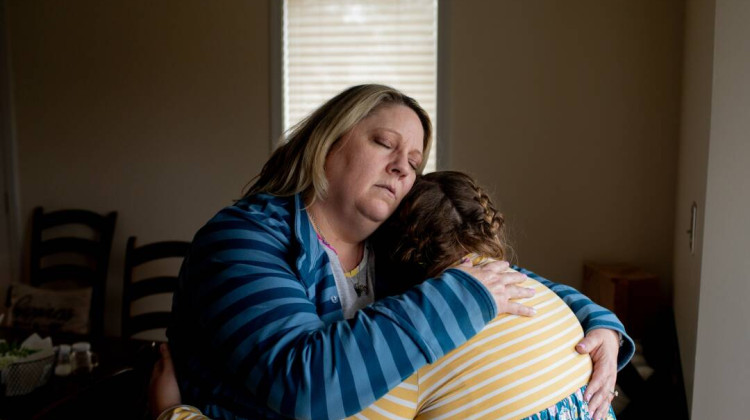
Mitch Carroll, a retired cop who works for the Madison County Prosecutor's Office visits families to investigate school truancy, on Thursday, May 2, 2024.
Dylan Peers McCoy / WFYIIt was about 2 p.m. on a Thursday in May when Mitch Carroll pulled up to an apartment building with teal trim in Madison County, Indiana.
He was wearing jeans, a T-shirt and pristine white sneakers. But to the middle-aged woman who opened the door, it was obvious he was in law enforcement. He had a badge and a Glock 9 mm pistol at his waist.
“Hi, you Sharon?” Carroll asked.
“Yeah,” the woman replied.
“Sharon, I’m Mitch Carroll. I’m with the Madison County Prosecutor’s Office,” he said. “Deep breath. You’re not in trouble.”
A retired cop, Carroll investigates school truancy. He tries not to alarm the families he visits because he wants to build relationships with them — relationships that, he hopes, will help make sure students in his county get an education.
School absenteeism surged during the pandemic, and it has remained stubbornly high. In the 2022-23 school year, roughly a quarter of U.S. students were chronically absent, according to data compiled by the American Enterprise Institute. That means, excused or unexcused, they missed 10% or more of the school year. Those missed days can get in the way of learning: Younger students are less likely to read at grade level, and that makes them more likely to drop out of high school later on.
When students miss lots of school without an excuse, it’s known as truancy. Every state has a truancy policy, and many of those policies make not going to school illegal.
The consequences vary by state and jurisdiction. In some truancy cases, courts may jail parents or detain students. More typically, families face court oversight of school attendance, required meetings, fees and home visits from officers like Carroll.
Making sure families have a plan for schooling
NPR joined Carroll as he drove around Madison County visiting families. He stopped at Sharon’s home because her 14-year-old grandson had about 30 absences. We’re only identifying Sharon by her first name and not naming her grandson because this story involves sensitive information about him.
As she stepped out onto her porch, Sharon called for her grandson, who is in middle school. She said the reason he missed so many days was because he gets anxious.
“It's not that he doesn't want to go to school,” Sharon told NPR during the visit. “He’ll get dressed and get ready to go. But then when he gets ready to go, he would just get himself all worked up.”
Sharon said she has doctor’s notes for many of his absences, and she asked his doctor for help. But he still struggled. She recently withdrew her grandson from public school. She planned to homeschool, which she hoped would be less stressful for him.
“My job here, Sharon, is to make sure that you know; I just didn’t want him not going anywhere,” Carroll said. “Because you know at some juncture, you could be hearing from juvenile probation.”

After Carroll left, he said he was optimistic about his visit with Sharon. Sometimes caregivers say they are going to homeschool without having a plan to educate their kids, Carroll said. But Sharon was working with her niece, who homeschooled her own children. “That’s a win.”
In his visits, Carroll is friendly and calm. Still, a door knock from a law enforcement officer can be nerve-racking for guardians. It was for Sharon.
“I recognized him when he came up,” she told NPR. “I thought, ‘Oh, shoot. I'm going to the police station. They're booking me. And he's going to juvenile.’ ”
When NPR called Sharon in July, she said she planned to send her grandson back to school. His doctor had placed him on medication, and she believed he would do better this year.
Do these interventions work?
There’s no simple explanation for why the surge in school absenteeism has persisted as the pandemic has waned. Educators tell NPR that students often stay home with relatively minor illnesses. Unstable housing, unreliable transportation and mental health challenges like depression and anxiety can also play a role. Some students skip school because they just don’t want to go.
In many communities, the problem can seem intractable.
“Schools are overwhelmed,” said Nina Salomon of the Council of State Governments Justice Center. Communities don’t always have resources — like behavioral health support — to help families with underlying issues, Salomon explained. “So we see a lot of states that are trying to use the court system more, because they feel like that's the only tool at their disposal.”
There isn’t a lot of high-quality research into court-based truancy interventions, said Clea McNeely, a professor at the University of Tennessee, Knoxville. McNeely is one of the few researchers who has looked at these programs.
She studied an intervention model run by the county attorney’s office and local school districts more than a decade ago in Ramsey County, Minn. It began with meetings between families and county attorneys. If students continued to miss school, families were required to sign contracts that included a plan for improving attendance. For example, the parents might try to change their work schedules. Eventually, if attendance still didn’t improve, cases might go to court.
McNeely’s findings: There was no change in attendance for elementary schoolers, and middle and high schoolers actually missed slightly more school than students in a neighboring county without a similar program.
"It kills me to deliver this news. I loved this program,” McNeely said. “And not only does it not improve attendance, but it gets kids of color and low-income kids early contact with the juvenile justice system that is not good for them.”
McNeely said her findings were specific to Ramsey County’s approach in the 2000s. She cautioned that court intervention programs can vary widely and warned against drawing broad conclusions based on her research.
“You can't say it works, or it doesn't work,” McNeely explained. “You have to pay attention to how it's structured.”
For McNeely, one of the main problems with court interventions is they cost money that could be spent on other, more effective strategies. She cited a home-visit model in Connecticut, which early evidence suggests has improved attendance.
But in Connecticut, law enforcement doesn’t visit homes — educators and community members do.
Indiana prosecutors say they’re playing an essential role
In Madison County, Indiana, where Mitch Carroll works, schools referred over 600 students and guardians to the prosecutor’s office last school year for violating the state’s truancy laws. Many of those cases ended with warning letters, the prosecutor’s office said. But the office filed truancy cases for about 40 students, and it charged over 120 parents and guardians with violating the state’s compulsory school attendance laws.
Chief Deputy Prosecutor Andrew Hanna said adults “won't actually face a criminal punishment as long as we're getting them to get their kid in school. That's our goal here. It's not to jam people up with criminal charges. It's not to make their lives more difficult than they already are.”
Researchers may be skeptical that the justice system can help, but Hanna and his boss — Prosecutor Rodney Cummings — argue that their office should enforce the state’s school attendance laws and use the courts to try and make sure children and teens get an education.
“The cases that we're charging are where parents are falling woefully short of their most basic responsibilities to their children and to ensuring that they get an education,” Hanna said.
The Madison County Prosecutor’s Office doesn’t yet have data on whether its enforcement efforts are helping to improve attendance because its focus on truancy is relatively new. Staff there described their efforts as a work in progress, and they say they are trying to improve as they learn more.
Investigator Mitch Carroll maintains a kind of amiable positivity as he visits families. But sometimes a visit does feel like a failure.
“Usually if it’s that — it’s because the parents are apathetic or just not engaged,” he said. “I’ve had plenty where the parents are just not interested in being parents.”
“It’s not a perfect scenario”
On the day NPR joined Carroll on his visits, he knocked on close to a dozen doors. Most of the families answered.
Carroll learned that a high schooler who only did about 20 minutes of virtual school a day had recently had a baby.
He spoke to the mother of a middle schooler who was bullied and skipped school to go to a friend’s house.
And he met a 16-year-old who had been working shifts at Walmart instead of logging on to online classes.
Around 4 p.m., Carroll pulled up to a nondescript house on a quiet suburban street.
The family had multiple elementary schoolers who each had more than 20 unexcused absences. A woman opened the door and invited Carroll in. NPR is only identifying her by her middle initial, J, so she could talk freely about how she decides when to keep her kids home from school.
“Are you familiar — and I don’t want to be condescending to you, you sound like a smart gal,” Carroll said, “but do you understand the difference between an excused absence and an unexcused absence?”
“Yeah, it’s literally because I forget to turn in their papers,” J explained. She said her children miss a lot of school because of illness. Two of her kids have asthma, and the family has gotten the flu twice in recent months.
“If these three children got the flu I’m not going to send the other ones,” she said, “because I feel like it’s gonna make everybody else sick.”
If J can get doctor's notes, the days when her children were sick won’t be counted as truancy under Indiana law.
But no matter why students are absent, missing school can be bad for kids in the long run. It can lower their achievement in reading and math and reduce their chances of graduating from high school.
After he left J’s house, Carroll told NPR he planned to follow up with the school. The kids have missed a lot of days, and “it’s not a perfect scenario,” he said. But “the home looks clean. The kids are clean. They were well behaved.”
One more stop, and then Carroll headed back to the prosecutor's office.
He was done for the day. But he’ll keep making visits into the summertime. He hopes it makes a difference and that it might be enough to get students back to school.
Edited by Nicole Cohen
Audio story produced by Janet Woojeong Lee
Contact WFYI education reporter Dylan Peers McCoy at dmccoy@wfyi.org.
 DONATE
DONATE






 Support WFYI. We can't do it without you.
Support WFYI. We can't do it without you.